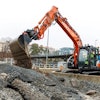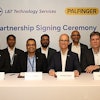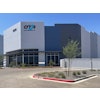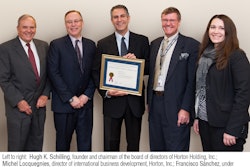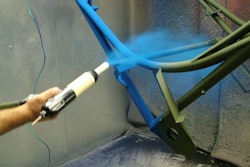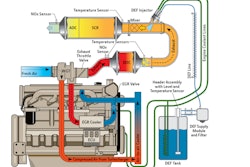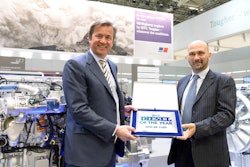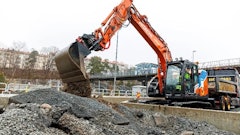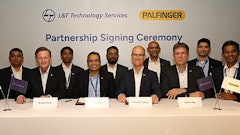“While three years ago, our industry – with the exception of the manufacturers of mining machinery – suffered immensely from the effects of the worldwide economic and financial crises, today’s situation has improved significantly – except for those countries that are currently most affected by the Euro crises,” Dr. Thomas Lindner, President of the German Engineering Federation, said at a press conference organized by the association on the occasion of the opening of bauma 2013 in Munich on Monday, April 15.
“Since the beginning of 2010, the international market for construction equipment and building material machinery has picked up again and recovered. We are expecting to see a slight growth in the second part of 2013, making up for the current dent, so that also for this year German manufacturers will come close to last years’ total turnover equaling 12.5 billion euros." Export quota for our construction equipment and building material machinery industry is 73%. Thirty-nine percent of all export trades are done with other countries within the EU. “Markets in Greece, Portugal and Spain, but increasingly also in Italy and France, have been sliding rather significantly,” explained VDMA’s president. Additionally, also the weak Chinese market is of concern, according to him. He said that in 2012 German sales in that field fell by 25%. “Especially with regard to standard machinery, the Chinese picked up immensely over the past couple of years. Meanwhile, for many a VDMA member company they have become real competitors, even on the world market. But up to now, the Germans used to be at least one step ahead of them. We are confident to be able to keep this technological edge also for the foreseeable future,” Lindner said.
Significant competitive disadvantage for European construction equipment industry due to EU emission level III B
The very short intervals in which new emission regulations – all of which are significantly stricter than the ones already in place – come into effect and may require retrofitting within the EU – put the position at risk that German companies currently hold on the world market. “This particularly applies to all those manufacturers who sell their machinery inside and outside Europe and to the USA. As outside Europe and the USA the same regulations do not apply and the relevant low-sulphur diesel fuel, which is required for running those diesel engines particularly low in emission, is not available, all companies have to build two different versions of the very same machine. This means that there has to be one machine to be sold in Europe and the USA and another one to be offered on the remaining markets,” VDMA’s president reported. “It is without any doubt that protection of the environment is important and our industry is a leader in this regard also,” Lindner emphasized. “However, new environmental requirements concerning construction equipment need to have the desired effects, whereas excessive regulations might push an entire industry into an increasingly marginal role.” According to him, politicians are currently tempted to push popular measures, such as demanding to retrofit filters, which mean enormous cost without generating a measurable reduction of environmental impact.
Changes in taxation difficult for family-owned businesses
Companies need to invest constantly and significantly to be able to offer innovative products but also to keep up with new environmental requirements and the energy revolution, the latter being of great interest at the moment. “The engineering industry in general – and the construction equipment and mining machinery industry in particular – are facing enormous financially intensive challenges. The investments we have to make are extremely high,” VDMA’s president pointed out. Which lead him to the topic of tax on assets and capital levy that currently are on German politicians’ agendas a lot - mainly for populist and tactical reasons, as he put it. “In this context, you have to realize that most owners of middle-sized family-run companies hold and invest their money in their companies almost entirely. The changes in taxation currently being discussed in Germany put these business assets at risk,” he said. According to him, a capital levy – as requested by the German Green Party – or tax on assets – as the Social Democratic Party of Germany demands – are “like throwing spanner in the works for German companies investing and offering innovative new products and clearly are attacking the competitiveness and stability of German jobs,” Lindner stated. When you add the demand for inheritance tax to capital levy and tax on assets, “you can see very clearly that all tools currently discussed are destroying the bases for family-owned businesses in Germany. I do not think there is need to describe what effect this would have in the long-term,” VDMA’s president explained.
German mining machinery industry on record high
Mining machinery manufacturers based in German hardly had to suffer the financial and debts crisis. Since 2007, their annual turnover grew by about 13% on average. In 2011, growth was nearly 27%. In 2012, turnover increased by another 28%, equaling 6.2 billion euros. “Mining machinery ‘Made in Germany’ – just like construction equipment and building material machinery – have an excellent reputation worldwide,” Lindner stated. According to him, the manufacturers expect similar sales for 2013 – as they already have orders in their books for the coming 12 months and more. Even a slight growth is likely, he said.
Partner country Indonesia an important trade partner for German mechanical engineers
Indonesia – the partner country of this year’s bauma – is an important trade partner for German mechanical engineering and construction. “The value of machinery delivered to Indonesia has more than tripled over the past ten years - growing from 332 million EUR (2003) to 1.1 billion EUR (2013),” VDMA’s president explained. But the German companies could still offer more – as these figures only represent a share of supply of 1.5% in construction equipment and building material machinery and 1% in mining machinery. This is also a reason for selecting Indonesia to be this year’s partner country.
“Think big“ - 9,000 pupils to experience bauma ’live‘
“Think big” is an initiative by VMDA in cooperation with the German Federal Association on Agriculture, Construction and Technology (Bundesverband LandBauTechnik) and Munich Fair, aiming at inspiring young people to find out more about technology and this industry. “More than 9,000 pupils of 170 schools are registered for the event. The program we offer is especially geared at young people. At ‘Workbench live’ young people can try out bolting and carrying out maintenance work. In addition, there are twelve companies belonging to our industry which show them what working in technology can be like and what career paths there are,” Lindner said.
